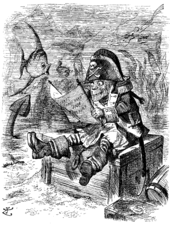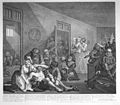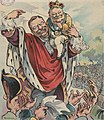Portal:Cartoon
The Cartoon Portal

A cartoon is a type of visual art that is typically drawn, frequently animated, in an unrealistic or semi-realistic style. The specific meaning has evolved, but the modern usage usually refers to either: an image or series of images intended for satire, caricature, or humor; or a motion picture that relies on a sequence of illustrations for its animation. Someone who creates cartoons in the first sense is called a cartoonist, and in the second sense they are usually called an animator.
The concept originated in the Middle Ages, and first described a preparatory drawing for a piece of art, such as a painting, fresco, tapestry, or stained glass window. In the 19th century, beginning in Punch magazine in 1843, cartoon came to refer – ironically at first – to humorous artworks in magazines and newspapers. Then it also was used for political cartoons and comic strips. When the medium developed, in the early 20th century, it began to refer to animated films that resembled print cartoons. (Full article...)

In print media, a cartoon is a drawing or series of drawings, usually humorous in intent. This usage dates from

Selected article -
Lupo the Butcher is a 1987 three-minute animated short comedy film directed and written by Danny Antonucci. The short follows the story of a psychotic butcher who swears at his meat and has a huge temper when the smallest things go wrong. Produced by Marv Newland's International Rocketship Limited, Lupo the Butcher was a successful short and has earned itself a cult following. Eric Fogel, co-creator of Glenn Martin, DDS stated that Lupo the Butcher inspired him to pursue a career in animation, saying: "That film opened my eyes to a world of animation that was strictly for grownups and inspired me to pursue a career path that was a bit more…twisted." It was featured in Spike and Mike's book Outlaw Animation, written by Jerry Beck, and in the Spike and Mike DVD.
Selected character -
Bart Simpson is a fictional main character in the animated television series The Simpsons and part of the eponymous family. He is voiced by actress Nancy Cartwright and first appeared on television in The Tracey Ullman Show short "Good Night" on April 19, 1987. Bart was created and designed by cartoonist Matt Groening while he was waiting in the lobby of James L. Brooks' office. While the rest of the characters were named after Groening's family members, Bart's name was an anagram of the word brat. After appearing on The Tracey Ullman Show for three years, the Simpson family received their own series on Fox, which debuted December 17, 1989. He has appeared in other media relating to The Simpsons; including video games, The Simpsons Movie, The Simpsons Ride, commercials, and comic books; and inspired an entire line of merchandise. Hallmarks of the character include his chalkboard gags in the opening sequence; his prank calls to Moe the bartender; and his catchphrases "Eat my shorts", "¡Ay, caramba!", and "Don't have a cow, man!" Nancy Cartwright has won several awards for voicing Bart, including a Primetime Emmy Award in 1992 and an Annie Award in 1995. In 2000, Bart, along with the rest of his family, was awarded a star on the Hollywood Walk of Fame.
Did you know... -
- ...that the film Green Lantern starring Ryan Reynolds has been in development since the 1990s and once included a comedic incarnation with Jack Black set to star?
- ...that the Simpsons short Good Night aired April 19, 1987 on The Tracey Ullman Show and was the first ever appearance of the Simpson family on television?
- ...that Friz Freleng's 1937 cartoon Clean Pastures narrowly evaded Hollywood Production Code censors, before being removed from distribution by United Artists in 1968?
- ...that Ed, Edd n Eddy's TV movie series finale, Ed, Edd n Eddy's Big Picture Show, premiered on November 8, 2009, and achieved high ratings success for Cartoon Network?
Selected list -
There were 61 episodes of Avatar: The Last Airbender, an Emmy Award-winning American animated television series written and created by Michael Dante DiMartino (pictured) and Bryan Konietzko. It first aired on February 21, 2005 with a one-hour series premiere and concluded its run with a two-hour TV movie on July 19, 2008. The Avatar franchise refers to each season as a "Book", in which each episode is referred to as a "chapter". Each "Book" takes its name from one of the elements that the protagonist must master: Water, Earth, and Fire. The show's first two seasons each consisted of 20 episodes, while the third season had 21. In addition to the three seasons, there were two recap episodes and three "shorts". The first recap summarized the first eighteen episodes while the second summarized season two. The first self-parody was released via an online flash game. The second and third were released with the Complete Second Season Box Set DVD. The entire series has been released on DVD in both Region One and Region Two.
General images -
Selected biography -
Steve Jobs (b. 1955, d. 2011) was an American business magnate and inventor. He is co-founder, chairman, and former chief executive officer of Apple Inc. Jobs also previously served as chief executive of Pixar Animation Studios; he became a member of the board of directors of The Walt Disney Company in 2006, following the acquisition of Pixar by Disney. He was credited in the 1995 film Toy Story as an executive producer. In the late 1970s, Jobs, with Apple co-founder Steve Wozniak, Mike Markkula, and others, designed, developed, and marketed one of the first commercially successful lines of personal computers, the Apple II series. In the early 1980s, Jobs was among the first to see the commercial potential of Xerox PARC's mouse-driven graphical user interface, which led to the creation of the Macintosh. After losing a power struggle with the board of directors in 1985, Jobs resigned from Apple and founded NeXT, a computer platform development company specializing in the higher-education and business markets. Apple's subsequent 1996 buyout of NeXT brought Jobs back to the company he co-founded, and he served as its CEO from 1997 until 2011. In 1986, he acquired the computer graphics division of Lucasfilm Ltd which was spun off as Pixar Animation Studios. He remained CEO and majority shareholder at 50.1% until its acquisition by The Walt Disney company in 2006. In 2011, Apple announced that Steve Jobs had died at the age of 56.
Subcategories
WikiProjects
- Main projects
- Arts • Animation • Comics • Entertainment • Visual arts
- Related Projects
- Anime and manga • Biography • Film • Fictional characters • Media franchises • Music • Television • Video games
Selected quote -
Topics
- Comic book
- Comic strip
- Digital comics
- Graphic novel
- Mobile comic
- Motion comics
- Trade paperback
- Webcomic
- Animator
- Animation director
- Animation studios
- Animation film festivals
- Feature-length films
- Short films
- Television series
- Computer-animated films
- Stop-motion films
- Traditional animation
- Limited animation
- Rotoscoping
- Stop Motion
- Clay
- Cutout
- Graphic
- Model
- Object
- Pixilation
- Puppetoon
- Computer animation
- Flash animation
- PowerPoint animation
- SVG animation
- Cel-shaded animation
- Crowd simulation
- Morph target animation
- Motion capture
- Non-photorealistic rendering
- Skeletal animation
Things you can do

- Requested articles: Fenwick (comics), Khimaera (comics), Mutant Underground Support Engine, Bruce J. Hawker, Marc Dacier, Hultrasson, Frankenstein Comics, Dave Johnson (comics), Paco Medina, Dappere Dodo, New Adventures of the Space Explorers, Habatales, Musical Box, Foo-Foo (TV series), Bonne nuit les petits, The Adventures of Lariat Sam, More...
- Images and photos needed: Request images that are needed from Wikipedia requested images of comics and animation to included in each articles.
- Stubs: Work on stubs in articles in Comics and Animation stubs.
- Infobox: Add infobox that are needed from Category:Comics articles without infoboxes and Category:Animation articles needing infoboxes in articles.
- Deletion sorting: Please see the collection of discussions on the deletion of articles related to comics and animation - compiled by WikiProject Deletion sorting
Related portals
Associated Wikimedia
The following Wikimedia Foundation sister projects provide more on this subject:
-
Commons
Free media repository -
Wikibooks
Free textbooks and manuals -
Wikidata
Free knowledge base -
Wikinews
Free-content news -
Wikiquote
Collection of quotations -
Wikisource
Free-content library -
Wikiversity
Free learning tools -
Wiktionary
Dictionary and thesaurus









































